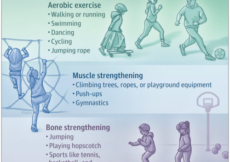Many young people spend much of their time using digital screens which may reduce their engagement in physical activity. But children have always been sedentary during most of their awake time. This has been shown every time researchers have measured physical activity among different groups of children regardless of their cultural background and geography (also before the introduction of smartphones and gaming consoles). Thus, researchers continue to debate whether children’s use of screen media devices truly affects their engagement in physical activity or if screen time is just replacing other sedentary behaviors? A group of researchers from the University of Southern Denmark has attempted to answer this question in a carefully designed randomized controlled trial.
A total of 89 families (181 children, 164 adults) were randomly allocated in two groups. Families allocated to the intervention had to handover their smartphones and tablets for 2 weeks and reduce their recreational screen media use to less than 3 hours per week. Families allocated to the control group were instructed to continue with their usual screen media habits. Participants daily physical activity was objectively assessed over 7 days using accelerometers mounted on the thigh and trunk at baseline and at 2-week follow-up.
“We found that children in the screen reduction intervention group had an average of 45 min more daily physical activity compared to children in the control group. The difference between the groups were largest on weekend days where children in the screen reduction group had an average of 73 min more physical activity compared to children in the control group”, says Jesper Pedersen, PhD student at the University of Southern Denmark.
“The results of our trial clearly suggest that spending many hours using digital screens after school, kindergarten, and on weekends displaces some activities where children move more around. Thus, it is important that families with children create healthy and balanced use of screen devices in the home environment”, says Anders Grøntved, Professor at the University of Southern Denmark.
Parents were also a part of the study. Middle-aged or young adults are typically less physically active during their leisure time compared to children and their recreational use of screen media devices is at least as high as that of children. However, to the researchers surprise, there was no significant difference in daily movement during leisure between adults in the screen reduction group and the control group.
We were quite surprised when we saw the numbers for the adult paricipants. A potential explanation may be that adults are less spontaneous in their physical activity behaviour compared to children. Altohugh the results suggest that reducing screen media use is an ineffective way of increasing adults daily movement, it may still be a good idea for adults to balance their screen use in the home because we know from previous research that parental screen use in the home is strongly associated with children’s use of screen media. A reduction of recreational screen use among parents could be a key to balancing children’s own use.”
Anders Grøntved, Professor, University of Southern Denmark
The trial is a part of the SCREENS-project which was funded by a research grant from the European Research Council awarded to Anders Grøntved.
The study is published in the scientific journal JAMA Pediatrics 23/5-2022 (doi:10.1001/jamapediatrics.2022.1519).
More info about the eksperiment
- Families were recruited through a large digital survey which was sent out to parents in 10 different municipalities in the Region of Southern Denmark.
- All families completed a a 7-day baseline assessment and a 7-day follow-up assessment (during the last week of the intervention).
- Families allocated to the screen reduction group had to hand over their smartphones and tablets for two weeks. They received a non-smartphone in replacement of their smartphone. The non-smartphone could send text messages and make phone calls.
- Participating children had an average age of 9 years and adults had an average age of 41 years.
- Screen media reduction group: 45 families – 86 children og 82 adults.
- Control group: 44 families – 95 children og 82 adults.
Source:
University of Southern Denmark Faculty of Health Sciences
Journal reference:
Pedersen, J., et al. (2022) Effects of Limiting Recreational Screen Media Use on Physical Activity, Sleep in Families With Children. JAMA Pediatrics. doi.org/10.1001/jamapediatrics.2022.1519.



































